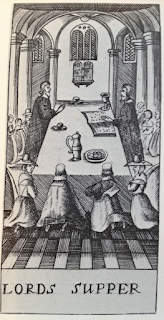"You shall see the comparison between the Paschal Lamb and our sacrament": the value of a 'hotter' Reformation account of the Supper
What struck me while reading this work, however, was the passage below and its comparison of the Sacrament of the Supper with the Passover lamb. It communicates something of the Reformation recovery of the significance of eating and drinking - rather than watching - the Sacrament, the power of the "Take and eat this, Drink this" of the 1559/1662 words of administration. It points to the continuity between Israel and the Church, a theme central to patristic readings of Scripture. And in drawing the comparison with the eating of the Passover lamb as the vivid memorial of the deliverance from Egypt, it gives a similarly vivid quality to the statement that "the Sacrament is called the body of the Lord".
In other words, it might urge us not to dismiss such 'hotter' Reformation accounts of the Sacrament, recognising in them worthy aspects of the sacramental teaching and piety of the reformed ecclesia Anglicana:
Seeing now that the Easter lamb hath the name of the thing that the Israelites remembered by it, and whereby they might everlastingly keep in remembrance the benefits of God therefore it is convenient that Christ called the bread his body and the wine his blood, because that we should remember thereby his death and passion, yea the only sacrifice of his body which he hath suffered to be broken, and his blood to be shed for us, not that the material body of Christ is in the bread nor his blood in the wine ... you shall see the comparison between the Paschal Lamb and our sacrament.
The Paschal Lamb was instituted and eaten the night before the children of Israel were delivered from Egypt. Likewise was the sacrament instituted and eaten the night before we were delivered from our sins. The Paschal Lamb was a very lamb in deed, and so the sacrament is very bread in deed.
The Paschal Lamb was called the passing by of the Lord, which destroyed the power of Pharaoh, and delivered them. The Sacrament is called the body of the Lord which destroyed the power of the devil & delivered us. The children of Israel were but once delivered from Egypt notwithstanding they did eat every year the Lamb to keep the deed in perpetual remembrance, even so Christ bought & redeemed us but once for all, although the sacrament thereof be daily broke among us to keep the benefit in continual memory.
As many as did eat the Paschal Lamb in faith & believed God's word as touching their deliverance from Egypt were as sure through faith as they were sure of the lamb by eating it. So as many as do eat this sacrament in faith & believe God's word as touching their deliverance from sin are as sure of their deliverance through faith as they are sure of the bread by eating it.
Now see you what the Paschal Lamb was to the Israelites, & what the sacrament is unto us.




Comments
Post a Comment